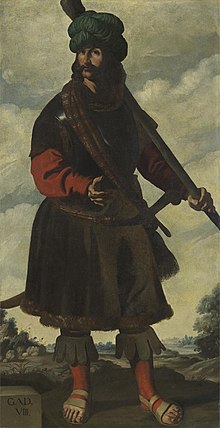Gad (son of Jacob)
Gad | |
|---|---|
| Template:Hebrew | |
 Painting by Francisco de Zurbarán (from Jacob and his twelve sons, c. 1640–45) | |
| Pronunciation | Gad |
| Born | 1564 BCE (10 Tishrei or 10 Cheshvan, AM 2198) |
| Died | (aged 125) |
| Children | King James Bible
And the sons of Gad; Ziphion, and Haggi, Shuni, and Ezbon, Eri, and Arodi, and Areli. [1] |
| Parents | |
| Relatives | Reuben (half brother) Simeon (half brother) |

Gad (Hebrew: גָּד, Modern: Gad, Tiberian: Gāḏ, "luck") was, according to the Book of Genesis, the first son of Jacob and Zilpah, the seventh of Jacob overall, and the founder of the Israelite tribe of Gad. However, some Biblical scholars view this as postdiction, an eponymous metaphor providing an aetiology of the connectedness of the tribe to others in the Israelite confederation.[2] The text of the Book of Genesis implies that the name of Gad means luck/fortunate, in Hebrew.
Biblical narrative and criticism
The Biblical account shows Zilpah's status as a handmaid change to that of an actual wife of Jacob (Genesis 30:9,11). Her handmaid status is regarded by some biblical scholars as indicating that the authors saw the tribe of Gad as being not of entirely Israelite origin;[3] many scholars believe that Gad was a late addition to the Israelite confederation,[3] as implied by the Moabite Stone, which seemingly differentiates between the Israelites and the tribe of Gad.[3] Gad by this theory is assumed to have originally been a northwards-migrating nomadic tribe, at a time when the other tribes were quite settled in Canaan.[3]
Rabbinical sources
According to classical rabbinical literature, Gad was born on 10 Cheshvan, and lived 125 years.[3] These sources go on to state that, unlike his other brothers, Joseph didn't present Gad to the Pharaoh, since Joseph didn't want Gad to become one of Pharaoh's guards, an appointment that would have been likely had the Pharaoh realised that Gad had great strength.[3]
Book of Jasher
The Book of Jasher states that Gad married Uzith. Uzith was the daughter of Amuram, the granddaughter of Uz and the great-grandson of Nahor (son of Terah).[3]
Traditional tombs
There are two tombs traditionally attributed to Gad: one at Nevei Ganda, Rehovot, Israel, and a Muslim one at Ain Al-Jadur (lit. "Spring of Jadur", whereas Jadur is the Arabic name of Gad), west of Salt, Jordan.
Family tree
| Noah | |||||||||||||||||||||||||||||||||||||||||||||||||||||||||||||||||
| Shem[4] | Ham | Japheth | |||||||||||||||||||||||||||||||||||||||||||||||||||||||||||||||
| Elam | Ashur | Arphaxad | Lud | Aram | 4 sons | 7 sons | |||||||||||||||||||||||||||||||||||||||||||||||||||||||||||
| Salah | |||||||||||||||||||||||||||||||||||||||||||||||||||||||||||||||||
| Eber | |||||||||||||||||||||||||||||||||||||||||||||||||||||||||||||||||
| Peleg | Joktan | ||||||||||||||||||||||||||||||||||||||||||||||||||||||||||||||||
| Reu | 13 sons | ||||||||||||||||||||||||||||||||||||||||||||||||||||||||||||||||
| Serug | |||||||||||||||||||||||||||||||||||||||||||||||||||||||||||||||||
| Nahor | |||||||||||||||||||||||||||||||||||||||||||||||||||||||||||||||||
| Terah | |||||||||||||||||||||||||||||||||||||||||||||||||||||||||||||||||
| Sarah[5] | Abraham[6] | Hagar | Haran[6] | ||||||||||||||||||||||||||||||||||||||||||||||||||||||||||||||
| Keturah | Nahor[6] | ||||||||||||||||||||||||||||||||||||||||||||||||||||||||||||||||
| Ishmael[7] | Milcah[6] | Lot[6] | Iscah[6] | ||||||||||||||||||||||||||||||||||||||||||||||||||||||||||||||
| Zimran Jokshan Medan Midian Ishbak Shuah | 1. Nebaioth 2. Kedar 3. Adbeel 4. Mibsam 5. Mishma 6. Dumah 7. Massa 8. Hadad 9. Tema 10. Jetur 11. Naphish 12. Kedemah Mahalath/Basemath (daughter) | 7 sons[8] | Bethuel[9] | 1st daughter[10] | 2nd daughter[10] | ||||||||||||||||||||||||||||||||||||||||||||||||||||||||||||
| Isaac[11] | Rebecca[9] | Laban[12] | Moab[10] | Ben-Ammi[10] | |||||||||||||||||||||||||||||||||||||||||||||||||||||||||||||
| Esau | Jacob | Leah | Rachel | ||||||||||||||||||||||||||||||||||||||||||||||||||||||||||||||
See also
- Tribe of Gad
- Gad (deity), pan-Semitic god of fortune
- Testament of Gad, apocryphal work
References
- ^ Genesis 46:16
- ^ Peake's commentary on the Bible
- ^ a b c d e f g Jewish Encyclopedia
- ^ https://www.sefaria.org/Genesis.11.11?lang=bi&aliyot=0
- ^ Sarah was the half–sister of Abraham (Genesis 20:12). An alternative tradition holds that she was Abraham's niece (see Sarah#In rabbinic literature).
- ^ a b c d e f Genesis 11:27–29
- ^ Genesis 16:15
- ^ Uz, Buz, Kemuel, Chesed, Hazo, Pildash, and Jidlaph (Genesis 22:20–22).
- ^ a b Genesis 22:20–23
- ^ a b c d Genesis 19:30–38
- ^ Genesis 21:1–3
- ^ Genesis 25:20, 24–26
